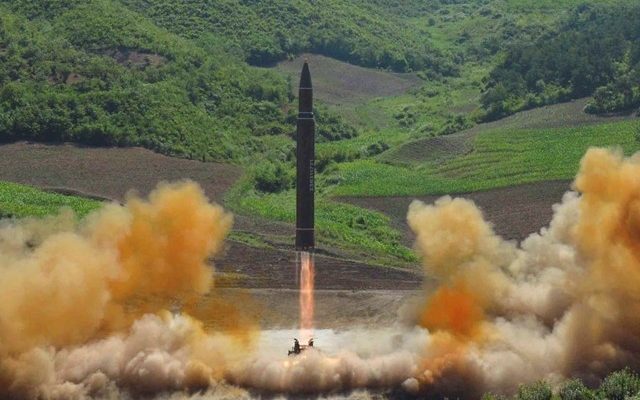North Korea vowed to continue developing nuclear weapons, announcing that its arsenal is not up for negotiations.
North Korean leader Kim Jong Un declared Wednesday that his nation will “demonstrate its mettle to the US” and plans never to put its weapons program up for negotiation. These comments come just one day after North Korea successfully tested its first intercontinental ballistic missile (ICBM).
Kim’s hard line suggests that North Korea will conduct more weapons tests until it perfects nuclear-armed missiles capable of striking anywhere in the United States. Analysts say Kim’s government believes nuclear weapons are the key to its own survival and could be used to wrest concessions from the United States.
While Tuesday’s ICBM launch, confirmed by US and South Korean officials, represents a new stage in North Korea’s efforts to develop long-range nuclear-armed missiles, the communist nation isn’t there yet, and many analysts say it needs more tests to perfect such an arsenal.
US Seeks Stronger Counter-Measures
Worry spread in Washington and at the United Nations (UN), where the US, Japan and South Korea requested an emergency UN Security Council session on Wednesday. US Secretary of State Rex Tillerson said the US response would include “stronger measures to hold the DPRK accountable,” using the acronym for the nation’s formal name, the Democratic People’s Republic of Korea.
In a show of force, US and South Korean troops fired “deep strike” precision missiles off South Korea’s east coast on Wednesday. South Korea’s military later released previously shot video showing the test-firing of sophisticated South Korean missiles and a computer-generated image depicting a North Korean flag in flames with the backdrop of a major building in Pyongyang, North Korea’s capital.
Gifts for the Yankees
North Korean state media on Wednesday described Kim as “feasting his eyes” on the ICBM, which was supposedly capable of carrying a large nuclear warhead, before its launch. “With a broad smile on his face,” Kim urged his scientists to “frequently send big and small ‘gift packages’ to the Yankees,” referring to the continuous stream of nuclear and missile tests Kim has touted since taking power in late 2011. State media said Kim also told “scientists and technicians that the US would be displeased to witness the DPRK’s strategic option” on its Independence Day.
Kim proclaimed that North Korea “would neither put its nukes and ballistic rockets on the table of negotiations … nor flinch even an inch” from bolstering its nuclear force, unless the US’ nuclear threat to the DPRK is “terminated,” reported the Korean Central News Agency.
The missile launch was a direct rebuke both to US President Donald Trump, who tweeted earlier that such a test “won’t happen,” and to South Korea’s new president, Moon Jae-in, who has pushed to improve strained ties with the North.
South Korea’s Defense Ministry said it was unable to verify whether North Korea had mastered re-entry technology for an ICBM. It said North Korea may now conduct a nuclear test with “boosted explosive power” to show off a potential missile-mounted warhead.
How Can Kim be Stopped?
With North Korea already under multiple rounds of UN sanctions for previous weapon tests, it’s unclear whether additional Security Council sanctions would stop it from pursuing its nuclear and missile programs.
“An attempt to curb Kim Jong Un’s nuclear and missile ambitions has clearly failed. I think North Korea won’t stop its nuclear drive until it feels that it has reached the level that it wants to reach,” said Lim Eul Chul, a North Korea expert at Kyungnam University in South Korea. “I don’t know when North Korea can reach that level. But I would say it’s imminent.”
North Korea already has a reliable arsenal of shorter-range missiles and is thought to have a small number of atomic bombs. Some outside civilian experts believe the North has the technology to mount warheads on shorter-range Rodong and Scud missiles that can strike South Korea and Japan, key US allies that host about 80,000 American troops. Whether North Korea has mastered the technology needed for an atomic bomb that can fit on a long-range missile remains unclear.
Regional disarmament talks on North Korea’s nuclear program have been stalled since 2009.
By: AP




